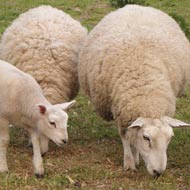Reminder on antibiotic use in neonatal lambs

‘We would particularly ask colleagues to refrain from using high-priority critically important antibiotics in sheep.’
Sheep vets are being reminded not to treat all neonatal lambs with an antibiotic from the start of the new lambing season.
In a letter to Vet Record, specialist vet Fiona Lovatt and others raised concerns about the high number of neonatal lambs that have, historically, been given a dose of prophylactic antibiotics.
Sales of lamb oral antibiotics reached 10.5 million doses in 2015. Anecdotal reports also suggest that ‘in some regions, there may be a significant use of either tablets or other antibiotics that are not licensed for use in sheep’.
Authors of the letter continued: ‘Although veterinary surgeons are in the privileged position of being allowed to prescribe medicines under the veterinary cascade, the use of unauthorised products must be fully justified and have clearly auditable clinical evidence.
‘We would particularly ask colleagues to refrain from using high-priority critically important antibiotics in sheep.’
The letter, which was signed by representatives from the Livestock Board NFU, National Sheep Association and Sheep Veterinary Society, said: ‘In individual flocks with close veterinary supervision, it may be appropriate use targeted control measures that include antibiotic treatment.’
Further information on the responsible use of antibiotics in sheep can be found in the Sheep Veterinary Society’s Responsible Use of Antimicrobials Good Practice Guidelines. This guidance aims to provide a summary of current information on disease control, whilst encouraging the replacement, refinement and reduction in antibiotic use.
Resources and case studies can also be found on: www.farmantibiotics.org/sheep



 The Veterinary Medicines Directorate (VMD) is inviting applications from veterinary students to attend a one-week extramural studies (EMS) placement in July 2026.
The Veterinary Medicines Directorate (VMD) is inviting applications from veterinary students to attend a one-week extramural studies (EMS) placement in July 2026.